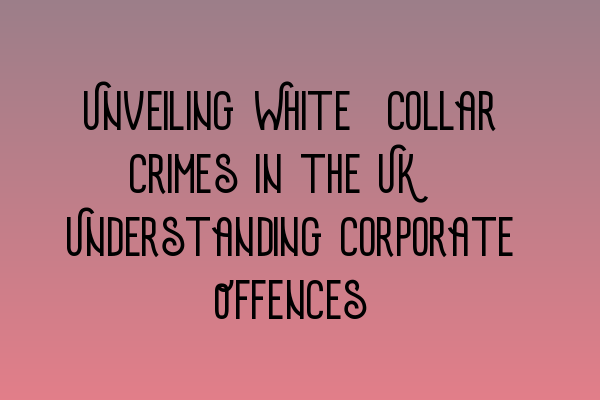Unveiling White-Collar Crimes in the UK: Understanding Corporate Offences
Welcome to SQE Criminal Law & Practice Law UK. In this blog post, we will delve into the world of white-collar crimes and shed light on the corporate offences that exist in the UK legal landscape.
What are White-Collar Crimes?
White-collar crimes encompass a range of non-violent criminal activities typically committed by individuals and organizations in professional settings, for financial gain. These crimes often involve complex schemes, deception, and manipulation, and can have a significant impact on individuals, businesses, and the economy as a whole.
Corporate offences, specifically, refer to acts or omissions committed by corporations or their employees, which violate laws and regulations governing commercial activities. These offences can include fraud, bribery, money laundering, insider trading, and many others.
The Impact of Corporate Offences
Corporate offences have far-reaching consequences, affecting not only the companies involved but also their employees, shareholders, customers, and the general public. These crimes can erode trust in the corporate sector, cause financial losses, damage reputations, and even lead to the collapse of businesses.
It is therefore crucial for businesses and individuals to understand the nature of these offences, the legal framework surrounding them, and the potential penalties they may face if found guilty.
Legal Framework of Corporate Offences in the UK
The UK has established a robust legal framework to address corporate offences. The primary legislation governing these offences includes the Companies Act 2006, Bribery Act 2010, Fraud Act 2006, and the Proceeds of Crime Act 2002.
These legislations outline the specific offences, provide definitions, and set out the penalties for non-compliance. Additionally, regulatory bodies such as the Serious Fraud Office (SFO), Financial Conduct Authority (FCA), and the National Crime Agency (NCA) play significant roles in investigating and prosecuting corporate offences.
Penalties for Corporate Offences
The penalties for corporate offences vary depending on the nature and severity of the crime. Convictions can result in hefty fines, imprisonment for individuals involved, disqualification of directors, confiscation orders, and damage to the company’s reputation.
It is essential for individuals and corporations to engage experienced solicitors who specialize in criminal law and have in-depth knowledge of corporate offences. Solicitors who are familiar with the Solicitors Qualifying Examination (SQE) format and can guide clients through the legal process are invaluable.
Consult SQE Criminal Law & Practice Law UK for Expert Legal Assistance
If you or your organization are facing allegations of corporate offences in the UK, it is crucial to seek expert legal assistance to navigate the complexities of the legal system. At SQE Criminal Law & Practice Law UK, our team of experienced solicitors is well-versed in corporate and criminal law, and have a proven track record of successfully defending clients in such cases.
For a comprehensive understanding of the Solicitors Qualifying Examination format, please refer to our related article: Demystifying the Solicitors Qualifying Examination Format. This article provides valuable insights into the format and structure of the examination, helping aspiring solicitors prepare effectively.
If you are an entrepreneur looking to establish a limited liability company (LLC) in the UK, our article LLC Formation Made Simple: Step-by-Step Guide for UK Entrepreneurs offers a comprehensive step-by-step guide to help you navigate the process quickly and efficiently.
To gain a deeper understanding of LLC formation and its legal implications, we recommend reading our article LLC Formation: A Step-by-Step Guide for UK Entrepreneurs. This guide provides detailed information on the legal requirements, tax considerations, and structuring options when forming an LLC.
Understanding the legal landscape and compliance requirements for businesses is vital. Our article Business Regulations in the UK: A Comprehensive Overview provides a comprehensive overview of the various regulations that entrepreneurs and businesses need to be aware of to ensure their operations are in compliance with the law.
For a comprehensive legal insight into corporate structures and their implications, our article Decoding Corporate Structures: A Comprehensive Legal Insight is a valuable resource. It explores different corporate structures and their advantages and disadvantages, helping readers make informed decisions.
Contact SQE Criminal Law & Practice Law UK today for expert legal guidance and representation in corporate offences cases. Our team is committed to protecting your interests and achieving the best possible outcome in your case.
We hope you found this blog post helpful and informative. Stay tuned for more insightful content from SQE Criminal Law & Practice Law UK!
